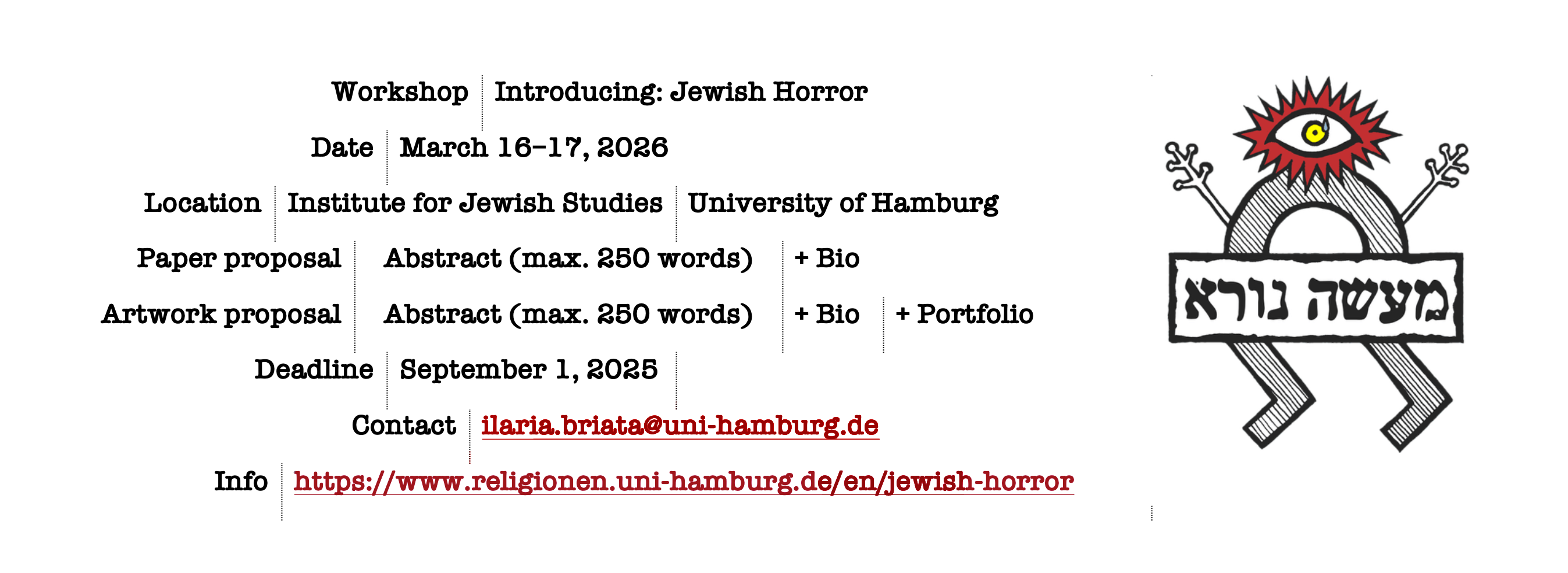Call for Papers

Workshop Introducing: Jewish Horror
Institute for Jewish Studies | University of Hamburg | March 16–17, 2026
The genre of horror in literature and cinema has become an increasingly important area of contemporary cultural production. In recent decades, scholarship has become more and more concerned with examining horror not only as a cultural phenomenon in (pop) contemporary literature and art, but also as a transhistorical category applicable to the precursors of the gothic, the weird and the pulp. Within this refreshing scholarly framework, which is expanding more and more from Western-centric premises to postcolonial concerns, the field of Jewish studies seems to be underrepresented, despite offering fertile yet unexplored ground.
Already in antiquity, the middle ages, and the early modern period, Hebrew literature, as well as literatures in other Judeo-languages such as Yiddish and Ladino, recorded narratives and reflections on all thing frightful––supernatural, like ghosts and demons, but also very real histories of violence. In the last years, incarnations of Jewish fears are making a comeback in cinema and literature thanks to widely distributed products such as The Golem by Doron and Yoav Paz (2018), The Vigil by Keith Thomas (2019), The Offering by Oliver Park (2023), and the The Jewish Book of Horror (Denver Horror Collective, 2021). Although evoking a hazy yet identifiable cluster of frightful, occult, or grotesque figments of the imagination rooted in Jewish tradition, like golems and dybbuks, the term ‘Jewish horror’ itself has not yet been univocally defined in current research.
The workshop Introducing: Jewish Horror intends to fill the gap on the study and conceptualization of Jewish horror, while inaugurating an intersection between the fields of Jewish studies and horror studies. Contributions shall focus on both ‘horror’ and ‘Jewish culture’ as heuristic categories: ‘horror’ extends beyond the label of genre, encompassing any cultural manifestation relating to fear and its cognate emotions, whereas ‘Jewish culture’ embraces any linguistic and historical phenomenon from the Bible to nowadays.
Suggested topics and perspectives include but are not limited to:
- Horror and the history of emotions in relation to Jewish culture
- Horror beyond genre, Judaism beyond religion
- Fear in religious practice and education
- The idea of yir’at shamayim, i.e., fear of God
- Jewish folklore and tradition in contemporary culture
- Jewish horror tropes across media
- Supernatural horror in Jewish literatures and media
- Body horror, death, and self in Jewish literatures and media
- Violence and trauma in in Jewish literatures and media
- Gender, fear, agency in Jewish literatures and media
- Jewish horror in comparative and/or cross-cultural perspective
- Jewish philosophies of horror and philosophies of Jewish horror
- Original interpretations and retellings of Jewish horror themes and traditions
The workshop will be held on March 16–17, 2026 at the Institute for Jewish Studies of the University of Hamburg in the framework of the project Horror and Manifestations of Fear in Early Modern Judaism, funded by the German Research Foundation (DFG).
Travel expenses and accommodation will be covered.
Revised versions of the papers presented will be collected for publication.
To submit a proposal, send an abstract (max. 250 words) and a short bio to PD Dr. Ilaria Briata (ilaria.briata"AT"uni-hamburg.de) before September 1, 2025. The workshop is open to both scholarly papers and non-academic contributions, presenting original work related to Jewish horror in any medium (creative writing, figurative art, graphic novel, photography, performaning arts). To submit a presentation of original artwork, please include also a sample o the proposed project or a brief portfolio of previous works.
